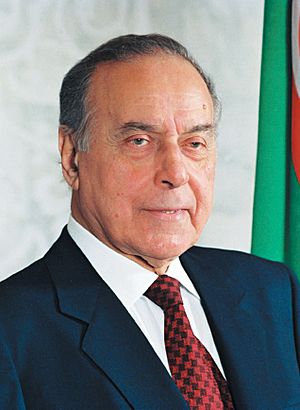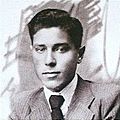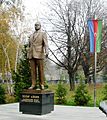Heydar Aliyev facts for kids
Quick facts for kids
Heydar Aliyev
|
|
|---|---|
| Heydər Əliyev | |
 |
|
| 3rd President of Azerbaijan | |
| In office 10 October 1993 – 31 October 2003 Acting: 24 June – 10 October 1993 |
|
| Prime Minister | Surat Huseynov Fuad Guliyev Artur Rasizade Ilham Aliyev |
| Preceded by | Abulfaz Elchibey |
| Succeeded by | Ilham Aliyev |
| Speaker of the National Assembly | |
| In office 15 June 1993 – 5 November 1993 |
|
| President | Abulfaz Elchibey Himself |
| Prime Minister | Surat Huseynov Fuad Guliyev |
| Preceded by | Isa Gambar |
| Succeeded by | Rasul Guliyev |
| First Deputy Premier of the Soviet Union | |
| In office 24 November 1982 – 23 October 1987 |
|
| President | Vasili Kuznetsov (acting) Yuri Andropov Vasili Kuznetsov (acting) Konstantin Chernenko Vasili Kuznetsov (acting) Andrei Gromyko |
| Premier | Nikolai Tikhonov Nikolai Ryzhkov |
| Preceded by | Ivan Arkhipov |
| Succeeded by | Andrei Gromyko |
| Full member of the 26th, 27th Politburo | |
| In office 22 November 1982 – 21 October 1987 |
|
| First Secretary of the Communist Party of Azerbaijan | |
| In office 14 July 1969 – 3 December 1982 |
|
| Preceded by | Veli Akhundov |
| Succeeded by | Kamran Baghirov |
| Candidate member of the 25th, 26th Politburo | |
| In office 5 March 1976 – 22 November 1982 |
|
| Chairman of the Supreme Assembly of the Nakhchivan Autonomous Republic | |
| In office 17 November 1990 – 9 October 1993 |
|
| Preceded by | Position established |
| Succeeded by | Vasif Talibov |
| Personal details | |
| Born |
Heydar Alirza oğlu Aliyev
10 May 1923 Nakhchivan, Azerbaijan SSR, Transcaucasian SFSR, Soviet Union |
| Died | 12 December 2003 (aged 80) Cleveland, Ohio, U.S. |
| Resting place | Alley of Honour |
| Political party | Communist Party of the Soviet Union (1945–1991) New Azerbaijan Party (1992–2003) |
| Spouse |
Zarifa Aliyeva
(m. 1948; died 1985) |
| Children | Sevil Aliyeva Ilham Aliyev |
| Alma mater | Baku State University |
| Awards | Hero of Socialist Labour (twice) |
| Signature | |
| Military service | |
| Allegiance | |
| Branch/service | Committee for State Security of the Azerbaijan Soviet Socialist Republic |
| Years of service | 1941–1969 |
| Rank | Major General |
Heydar Aliyev (born May 10, 1923 – died December 12, 2003) was an important Azerbaijani politician. He served as the third President of Azerbaijan from October 1993 to October 2003. Before becoming president, he was a high-ranking official in the KGB (a Soviet security agency) in Azerbaijan for 28 years. He also led Soviet Azerbaijan from 1969 to 1982.
Aliyev became president when Azerbaijan was facing big challenges. The country was close to a civil war and losing territory in the First Nagorno-Karabakh War. Many people believe he brought stability back to Azerbaijan. He also helped the country become a major energy producer, especially with oil. After his death in 2003, his son Ilham Aliyev became president.
Contents
Who Was Heydar Aliyev?
Heydar Aliyev was a powerful leader who played a key role in Azerbaijan's history. He rose through the ranks of the Soviet system. Later, he guided Azerbaijan as it became an independent nation. His leadership shaped the country's path for many years.
Early Life and Career
Heydar Aliyev was born on May 10, 1923, in the city of Nakhchivan. His family had moved there before he was born. He had four brothers and three sisters.
After finishing Nakhchivan Pedagogical School, Aliyev studied architecture. This was at the Azerbaijan Industrial Institute from 1939 to 1941. He also studied at security schools in Leningrad and Moscow. His official biography states he earned a history degree from Baku State University in 1957.
In 1948, Aliyev married Zarifa Aliyeva. They had a daughter, Sevil, in 1955, and a son, Ilham, in 1961. Zarifa Aliyeva passed away in 1985.
Starting His Career
Aliyev began his career in 1941 in Nakhchivan's internal affairs department. In 1944, he joined the state security committee of the Azerbaijan SSR. He quickly moved up in the KGB. By 1964, he was a Deputy Chairman. In 1967, he became the chairman of the Azerbaijani KGB. He earned the rank of major general.
Leading Soviet Azerbaijan
As head of the Azerbaijani KGB, Aliyev started a campaign against corruption. This helped him become the main leader of Azerbaijan. He was elected First Secretary of the Central Committee of the Azerbaijan Communist Party in 1969.
Fighting Corruption and Growing the Economy
Aliyev worked hard to fight corruption. Some people were sent to prison, and a few managers were even sentenced to death. He also tried to stop corruption in law schools.
During his time leading Soviet Azerbaijan, the country saw significant growth. This included economic, social, and cultural improvements. He helped raise Azerbaijan's standing and promoted Azerbaijanis to important positions.
Rising in the Soviet Union
In 1976, Aliyev became a candidate member of the Soviet Politburo. This was a very powerful group. In 1982, Yuri Andropov promoted him to a full member. Aliyev also became the First Deputy Chairman of the USSR Council of Ministers. This was the highest position an Azerbaijani had ever reached in the Soviet Union.
In 1987, Mikhail Gorbachev removed Aliyev from his positions. The official reason given was health problems.
Azerbaijan Becomes Independent
After leaving his Soviet roles in 1987, Aliyev stayed in Moscow until 1990. He publicly spoke out against the Soviet military crackdown in Baku in January 1990. This event was related to the conflict over Nagorno-Karabakh.
Soon after, Aliyev returned to his home region of Nakhchivan. There, he became a leader for local people. He was elected to the Supreme Soviet of Azerbaijan SSR in October 1990. He later became Chairman of the Supreme Soviet of Nakhchivan in 1991. That same year, he left the Communist Party of the Soviet Union.
Guiding Nakhchivan and Returning to Power
By December 1991, the Soviet Union broke apart, and Azerbaijan became an independent state. Aliyev led Nakhchivan independently. He even negotiated a ceasefire agreement with Armenia for Nakhchivan.
In 1993, Azerbaijan faced a government crisis and was close to civil war. People demanded that Aliyev return to power. On June 15, 1993, he was elected Chairman of the National Assembly of Azerbaijan. He then took on temporary presidential powers. In October 1993, Heydar Aliyev was elected President of Azerbaijan. In May 1994, he agreed to a ceasefire to end the fighting in Nagorno-Karabakh.
Leading Azerbaijan as President
On October 3, 1993, Heydar Aliyev was elected President of Azerbaijan with a large majority. He was re-elected in 1998. In 2003, he decided not to run again due to health issues.
Nagorno-Karabakh Conflict and Peace Efforts
When Aliyev became president, Azerbaijan was struggling with internal problems and military losses. Armenian forces had captured several districts, causing many people to leave their homes. Aliyev formed a new national army and started negotiations with Armenia.
Working Towards a Ceasefire
In May 1994, a ceasefire agreement was signed. This agreement stopped the fighting in and around Nagorno-Karabakh. Aliyev did not agree to Russian peacekeepers in the region. He continued to negotiate with Armenia, with help from international groups like the OSCE Minsk Group.
There were proposals for peace, including Armenian forces leaving occupied areas. However, these agreements were never fully put into action. The negotiations continued until the end of Aliyev's presidency.
Domestic Policies and Reforms
Aliyev introduced many changes within Azerbaijan to strengthen the country.
Creating a New Constitution
In 1995, Aliyev created a commission to write a new constitution for Azerbaijan. This new constitution was approved by a public vote in November 1995. It set up three main parts of government: the legislative (Parliament), executive (President), and judicial (courts).
In 2002, more changes were made to the constitution. These included changes to how presidential elections were decided and new rights for citizens.
Ending the Death Penalty
On February 3, 1998, Aliyev asked for the death penalty to be removed. He believed it was an important step for human rights and legal reform. The Parliament approved this, and the death penalty was replaced with life imprisonment. Azerbaijan also joined an international agreement against the death penalty in 1999.
Establishing the Ombudsman Office
Aliyev also worked to protect human rights. In 1998, he issued a decree on human rights. Based on this, an Ombudsman institution was created in Azerbaijan. An Ombudsman is a person who investigates complaints from citizens against the government. The first Ombudsman was appointed in 2002.
Changes in Farming and Land Ownership
Aliyev's government also made big changes to farming and land ownership. These "agrarian reforms" happened in two phases. The first phase, from 1995-1997, created new laws for farming. It focused on privatizing farms that used to be owned by the state or groups. The second phase, from 1998-2001, helped support these new private farms.
Foreign Policy and International Relations
During Aliyev's time as president, Azerbaijan improved its relationships with many countries and international organizations.
Working with the United Nations
Azerbaijan became very active in the UN. Aliyev attended UN General Assembly sessions and met with UN Secretary-Generals. He spoke about the conflict in Nagorno-Karabakh and asked for UN resolutions to be followed. After the September 11 attacks, Azerbaijan joined the UN's anti-terror coalition.
Partnering with NATO
Azerbaijan also started working closely with NATO (North Atlantic Treaty Organization). In 1994, they signed an agreement to improve security and defense cooperation. Azerbaijan became an associate member of the NATO Parliamentary Assembly.
Building Ties with the European Union
A cooperation agreement between Azerbaijan and the European Union was signed in 1996. This agreement covered trade, economy, culture, and preventing illegal trade. The EU also helped Azerbaijan with economic reforms. Aliyev helped organize an international conference in Baku in 1998 to restore the historic Silk Road.
Joining the Council of Europe
Azerbaijan was invited to join the Council of Europe (CoE) in 1996. Over the next few years, Azerbaijan changed its laws to meet European standards. In 2001, Azerbaijan became a full member of the CoE.
Relations with Russia and the US
Aliyev worked to build stronger relations with Russia. He signed agreements on friendship, cooperation, and security. He also made official visits to Russia.
Establishing closer ties with the United States was another key goal. Aliyev believed it was important to learn from Western democracy and culture. Relations grew stronger after oil contracts were signed. Aliyev visited the US in 1997 and met with President Bill Clinton. They signed statements on defense and energy cooperation. Azerbaijan later joined a US-led anti-terrorism coalition.
Oil Strategy for Development
Aliyev used Azerbaijan's rich oil resources to help the country grow. He attracted foreign companies to invest in Azerbaijan's oil fields.
In 1994, a major agreement was signed in Baku. This agreement, often called the "Contract of the Century," involved Azerbaijan and 11 oil companies from 6 countries. It focused on developing large oil fields in the Caspian Sea.
The State Oil Fund of Azerbaijan was created in 1999. Its purpose was to collect money from oil profits and use it for social and economic projects. Aliyev's oil strategy also planned for oil to be transported through different pipelines. These included the Baku–Supsa Pipeline and the Baku–Tbilisi–Ceyhan pipeline (BTC). The BTC pipeline, which transports oil to Turkey, began construction in 2002.
Death and Successor
Heydar Aliyev's health began to decline in 1999. He had several surgeries, including heart and prostate operations. In April 2003, he collapsed while giving a speech. He went to the United States for medical treatment in August 2003.
In October 2003, Aliyev stepped down from the presidency. He named his son, Ilham, as his party's candidate for president. Heydar Aliyev passed away on December 12, 2003, in Cleveland, Ohio. He was given a large state funeral and buried in the Alley of Honour cemetery in Baku.
His son, Ilham Aliyev, won the presidential election on October 15, 2003.
Honours and Awards
Heydar Aliyev received many awards and honours throughout his life. These included state orders and medals from the Soviet Union and international awards. He was also given honorary doctorates from universities in many countries.
Some of his notable awards include:
- The Order of Lenin (five times)
- The Order of the Red Star
- Hero of Socialist Labour (twice)
- Ukraine's highest award, the Yaroslav Mudry Order (1997)
- Turkey's highest honour, the Atatürk International Peace Prize (1999)
- Russia's supreme award, the Order of St. Andrew the Apostle the First-Called (2003)
- The Grand Cross of the Legion of Honour from France (2003)
Statues of Aliyev have been placed in different cities, including Belgrade.
Images for kids
-
Aliyev in his KGB uniform.
-
Aliyev during his visit to a state collective farm in the 1970s.
-
A meeting between Heydar Aliyev, Vladimir Putin and Robert Kocharyan in Kremlin on November 30, 2001.
-
The Heydar Aliyev International Airport in Baku.
-
Aliyev's statue in Belgrade.
See also
 In Spanish: Heydar Alíyev para niños
In Spanish: Heydar Alíyev para niños
- President of Azerbaijan
- Politics of Azerbaijan
- National Assembly of Azerbaijan
- Foreign relations of Azerbaijan
- List of political parties in Azerbaijan
 | Leon Lynch |
 | Milton P. Webster |
 | Ferdinand Smith |









